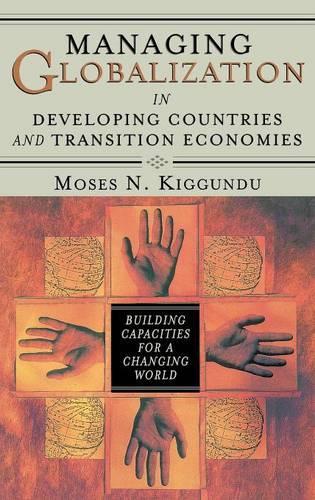
Managing Globalization in Developing Countries and Transition Economies: Building Capacities for a Changing World
(Hardback)
Publishing Details
Managing Globalization in Developing Countries and Transition Economies: Building Capacities for a Changing World
By (Author) Moses Kiggundu
Bloomsbury Publishing PLC
Praeger Publishers Inc
30th December 2002
United States
Classifications
General
Non Fiction
Development studies
337.091724
Physical Properties
Hardback
360
Description
Globalization is everyone's business, asserts Kiggundu in this comprehensive examination of globalization's influences on transition economies. Globalization presents challenges to developed and developing countries alike, and these challenges can and must be managed. Countries making the move from state-run to market-driven economies were faced with formidable obstacles even before globalization's effects were fully felt. Kiggundu argues that we, the incipient global society comprised of governments, corporations, NGOs, and individuals, must take a strategic approach to managing globalization. He explores strategies in the fields of public sector reform, governmental use of technology, foreign direct investment and international trade policy, the evolving World Trade Organization, cultures of entrepreneurship, labor standards, and environmental protection. Strategies for managing globalization are not merely to achieve and maintain dominance or competitiveness, but also to integrate the concerns voiced by globalization's harshest critics and most disenfranchised victims: ethics, equity, inclusion, physical and psychological human security, sustainability, and development. Kiggundu contends that these values, summarized in a 1999 United Nations Development report, should go hand in hand with the mantras we hear from the management literature: profitability and maximizing shareholder value, among other traditional corporate goals. Providing a broad variety of examples, from Chile's management of financial crisis to the vision statements of Botswana and Malaysia, Kiggundu delineates the many ways in which developing countries are successfully managing the vagaries of globalization.
Reviews
According to Kiggundu the globalization train is picking up speed, and nations must decide how they will approach these international economic alliances....Kiggundu presents a rigorous overview of the critical institutional factors that must be considered as well as the social, economic, and environmental problems that need to be addressed. The management strategy presented involves a series of very specific questions and strategies that can be adapted by governments to foster development of periphery nations....Highly recommended. General readers; students, lower-division undergraduate through graduate; and professionals.-Choice
"According to Kiggundu the globalization train is picking up speed, and nations must decide how they will approach these international economic alliances....Kiggundu presents a rigorous overview of the critical institutional factors that must be considered as well as the social, economic, and environmental problems that need to be addressed. The management strategy presented involves a series of very specific questions and strategies that can be adapted by governments to foster development of periphery nations....Highly recommended. General readers; students, lower-division undergraduate through graduate; and professionals."-Choice
Author Bio
MOSES N. KIGGUNDU is Professor of Business at the Eric Sprott School of Business at Carleton University in Ottawa, Ontario, where he teaches courses in management and strategy, human resource management, and international business. His research interests include institutional and capacity development, cross-cultural management, and the challenges of organizing and managing for gainful globalization. He is the author of several books, including Managing Organizations in Developing Countries (1989), Size and Cost of the Civil Service: Reform Programmes in Africa (1992), and An Analysis of Global Life Expectancy and Infant Mortality Using Health and Education Indicators (1992).
